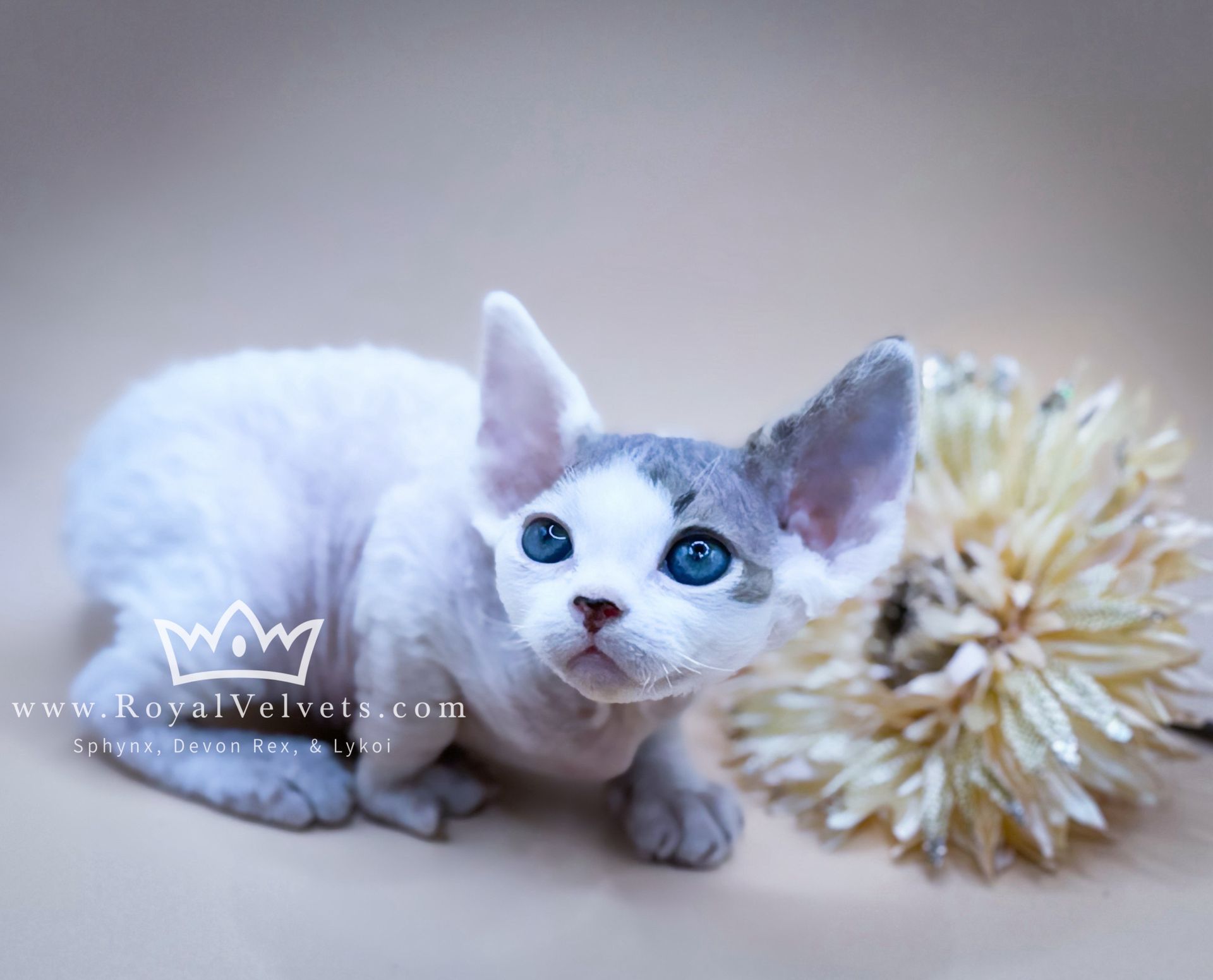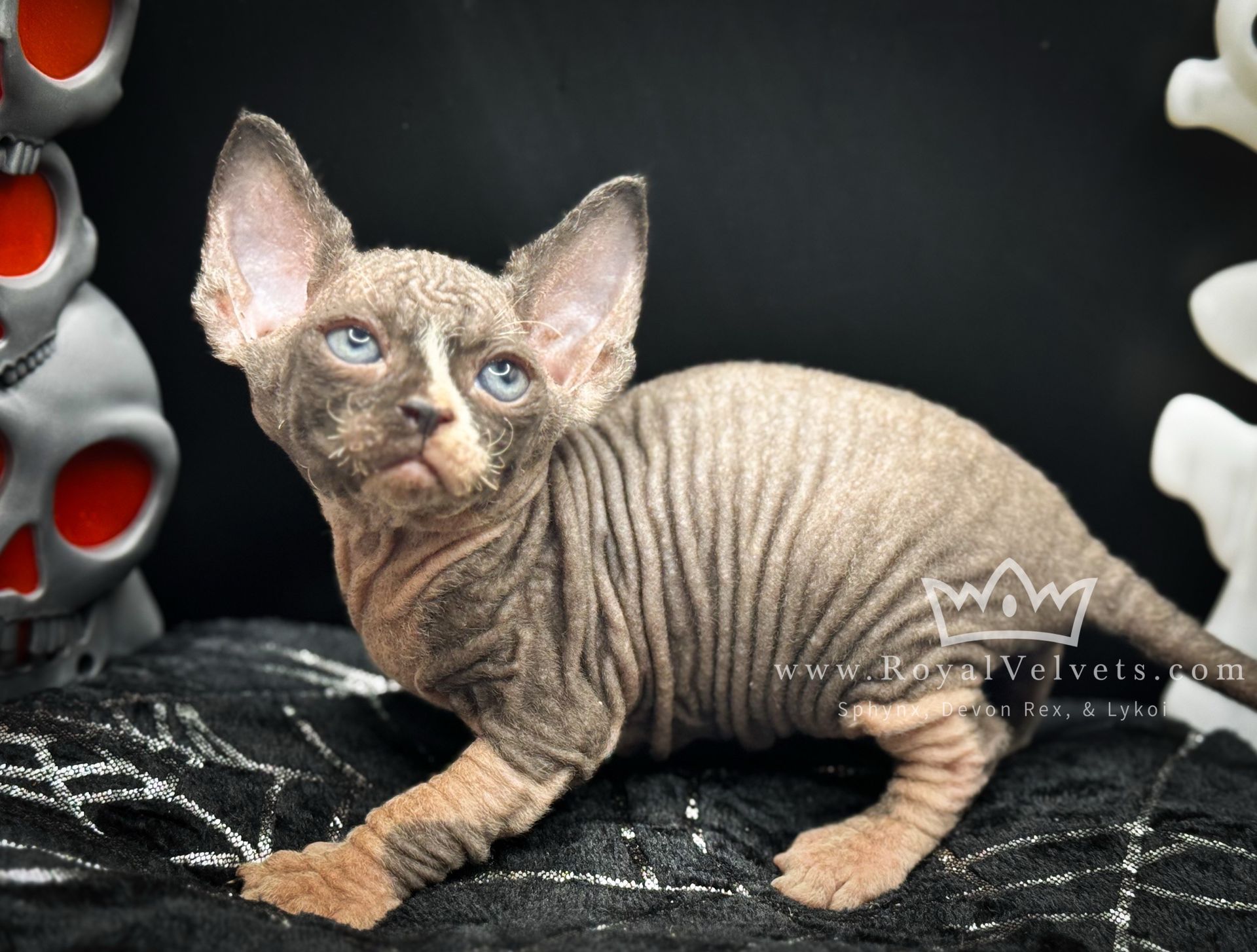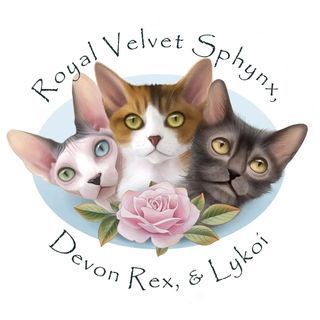Bringing home a Sphynx, Devon Rex, or Lykoi cat is an exciting journey into the world of rare and exotic breeds. These unique cats require special care, and as responsible pet parents, it’s important to understand their needs. This care guide covers everything from skin care to nutrition, helping you give your royal companion the healthiest, happiest life possible.
Why Exotic Breeds Require Special Care
Sphynx, Devon Rex, and Lykoi cats are very different from typical domestic breeds. They often require veterinarians who are familiar with their unique traits, health considerations, and care routines. At Royal Velvet, we stress the importance of education and preparation before welcoming your exotic kitten home.
Essential Facts & Care Tips
1. Coat & Skin
- Sphynx cats have little to no hair, while Devon Rex and Lykoi cats have fine or sparse coats. Hair thickness and texture can change depending on hormones, seasons, and environment.
- Their skin produces natural oils that aren’t absorbed by fur, which means they may need occasional baths. But please do not over bathe!! Washing more than once a month is too often and can cause the skin to overproduce the oils. Use Hypoallergenic PH balanced shampoo (never baby shampoo).
- Avoid sunscreens or lotions — they will lick these off. Instead, use UV sun shirts or lightweight clothing, but allow the skin to breathe.
Pro Tip: Many owners say their Sphynx smell like warm potato chips when cozy!
2. Nose & Sinuses
- Unlike other cats, Sphynx lack nasal hairs, which makes them prone to sneezing.
- Mild sneezing is normal, but colored discharge, coughing, or wheezing require veterinary care.
3. Ears
- With no ear hair, Sphynx and some Devon Rex/Lykoi cats collect more oil in the ear canal.
- Clean weekly with Zymox Cleaner and cotton swabs (never deep inside).
- Watch for itching, redness, odor, or head shaking, which can indicate infection or mites.
4. Eyes
- Sphynx kittens open their eyes early (1–5 days old), and without eyelashes, they are prone to tearing.
- Clear tearing is normal, but colored discharge or squinting requires a vet check.
5. Whiskers
- Many exotic cats (especially Sphynx) lack whiskers. They may use their paws like hands to sense depth or dip their feet in water to gauge levels.
6. Teeth
- Sphynx kittens may have brown-stained baby teeth due to porous enamel that absorbs natural oils while nursing.
- This is harmless and disappears as adult teeth come in.
7. Nails & Grooming
- Declawing is not recommended — Sphynx and Devon Rex use their paws almost like hands.
- Trim nails weekly and clean nail beds with baby wipes to remove trapped oil.
- Bath only when visibly dirty, not on a fixed schedule.
8. Diet & Appetite
- Exotic cats often have big appetites and fast metabolisms. Keep high-quality food available at all times.
- Provide access to fresh water (not milk).
- We recommend:
- Purina ONE Kitten Dry Food
- Fancy Feast Wet Food
- NuVet Plus Supplements for immune and digestive support
9. Litter & Hygiene
- Best options: Okocat pine pellets or paper pellets.
- Avoid dusty clay litters — they may irritate sensitive noses and skin.
- Use metal or ceramic bowls instead of plastic to prevent chin acne.
10. Warmth & Comfort
- These breeds feel warmer to the touch but have the same core temperature (101–102.5°F)
- Provide soft blankets, heated beds, or safe clothing in colder months.
11. Parasite & Health Care
- Fleas are less attracted to hairless cats, but protection is still important.
- We recommend Revolution for broad parasite control (fleas, ticks, mites, roundworms, mosquitoes).
- Routine deworming and yearly vet visits are essential.
12. Vaccinations
- Give kittens time to adjust before additional vaccinations. Stress can trigger sneezing or watery eyes.
- We recommend spacing vaccines: FVRCP and rabies should not be given on the same day.
13. Heart Health – HCM
- Hypertrophic Cardiomyopathy (HCM) is a serious heart condition common in Sphynx, Devon Rex, and Lykoi cats.
- At Royal Velvet, all breeding cats undergo yearly scans with a veterinary cardiologist.
- Pet owners should continue annual screenings for peace of mind and proactive care.
Final Thoughts
Sphynx, Devon Rex, and Lykoi cats are extraordinary companions that deserve extraordinary care. With proper nutrition, hygiene, veterinary oversight, and lots of love, your kitten will thrive as the royal family member they were born to be.
For more resources, explore our educational blogs:
- 👉 Proper Kitten Introduction to Their New Home
- 👉 The Ideal Diet for Your Exotic Kitten
- 👉 Common Viruses in Kittens & How to Handle Them
- 👉 Heartfelt Care: Understanding HCM in Cats
At
Royal Velvet, we are always here to answer questions and guide you through every step of life with your exotic companion. 🐾👑


